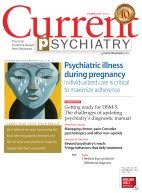Wednesday, April 1, 2009
Clinical guide to countertransference: Help medical colleagues deal with ‘difficult’ patients
Philip R. Muskin, MD
Professor of clinical psychiatry, Columbia University College of Physicians and Surgeons, Chief, Consultation-liaison psychiatry, Columbia University Medical Center, Faculty, Columbia University Psychoanalytic Center for Training and Research, New York, NY
Lucy A. Epstein, MD
Postdoctoral clinical fellow in psychosomatic medicine, Columbia University College of Physicians and Surgeons, New York, NY
Two strangers meet in the hospital cafeteria. Mrs. R, an elderly woman, asks Dr. W, a first-year medical resident, for help in getting a bottle of soda from the cooler. Afterward, Dr. W comments to a colleague with whom she is having lunch, “That woman reminds me of my grandmother.”
What does that comment reflect about Dr. W? It is a statement about the doctor’s transference. That is, she is aware of elements about Mrs. R that evoke internal responses appropriate to a prior important relationship.
What if Mrs. R was to subsequently faint, require admission to the hospital, and become Dr. W’s patient? If Dr. W’s comment indicates transference, would the same reaction to Mrs. R now be countertransference? Does that change if the doctor is unaware of emotions Mrs. R evokes? Is it still countertransference whether Dr. W is caring and compassionate, overly involved with Mrs. R, or—unaware of negative feelings associated with “grandmothers”—avoids the patient?
This article explores how complex internal experiences play out in the general medical setting and discusses how psychiatric consultants can help medical/surgical colleagues understand and manage difficult patient-physician relationships.
Listen to Dr. Muskin discuss "What to do when a patient makes you angry"
Read full text (free access)
Comment on this article
Email the editor
Subscribe to:
Post Comments (Atom)


No comments:
Post a Comment